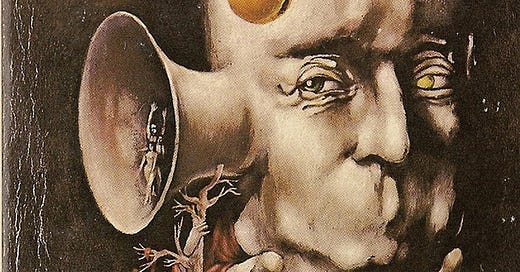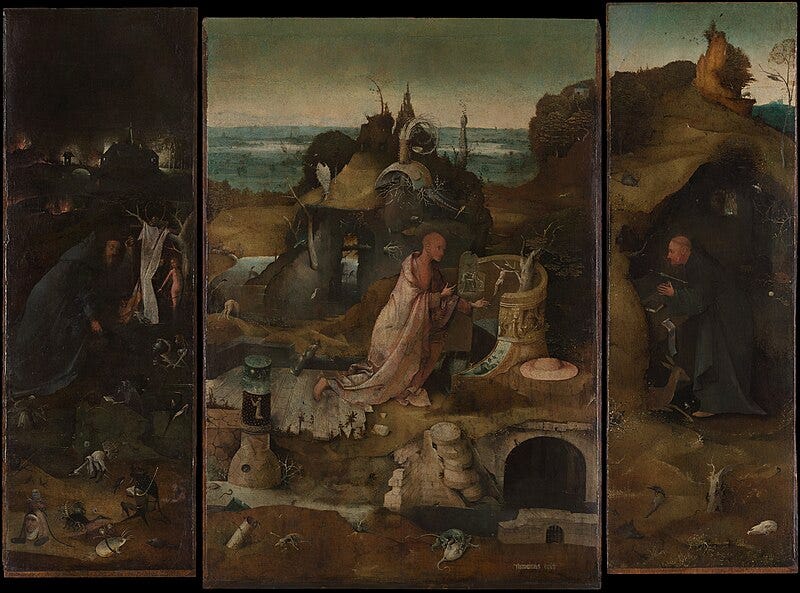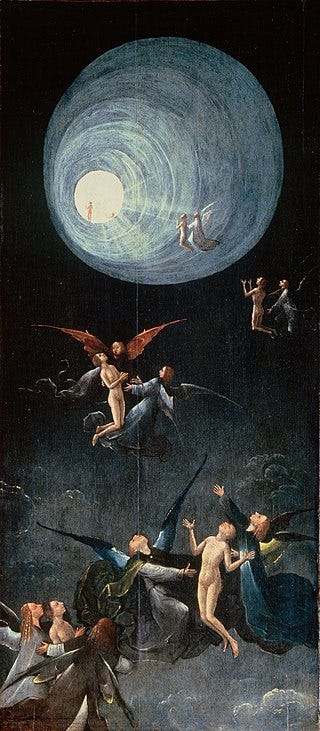recently it seems as if everyone has created a substack dedicated to whatever musings for niche topics they want to wax philosophically. in our deeply technological and digital age it is easy for everyone to bellow into the binary code abyss. this phenomenon is both jarring and worth considering. this sudden development on this website has led many to lament the fact that substack as an online forum has quickly devolved into nothing more than a slightly more intellectual variation of twitter or tumblr. one could spend hours browsing the manifestos alongside the mad ramblings; the pseudo-intellectual musings on mundanity and the genuine scholarly work of graduate students; there are both elitist highbrow cultural critics and the disenfranchised masses increasingly more radicalized. in short, a person could find any topic, any discipline, any subject discussed at length ad nauseum. substack now best demonstrates our obsession with the free market of thought. it has become the proverbial marketplace, the post-modern academy of the philosophers, the salons or cafes that used to pepper europe full of overly educated individuals with far too much free time. yet, there is another lens through which this can be examined, rather than just an appropriation of anti-capitalistic criticisms forced upon the digital agora. everyone wants to speak, particularly speak out, but there is seldom self-reflection. this presents us with both a spiritual and philosophical quandary. the ascetic monk journeys to the digital desert only to find the void and be struck with angst.
far it be it from me to ignore this issue i’ve just laid out and how i contribute to it. rather, that is the whole point of this piece. poems from the underground and my moniker of the underground seminarian are but one more voice which contributes to this cacophony raised to the abyss. when i started this endeavor about three years ago, my goal was singular: to share my poetry. the secondary reason was also self-serving as far as this was a way to keep writing poems. it was, in part, spurred by a professor my first year of seminary who asked us in his class if any of us were “artists.” he then continued to heartfully conclude something to the extent of: “it must be a terrible thing, to be an artist. to constantly feel driven to create though seldom satisfied, and to be tortured when you try to call it quits.” what this professor demonstrated, quietly wonderfully, is the innate drive for artists [and by extension the academic type] to continue creating art, tortured when they do and in agony when they don’t. perhaps, his view sounds a bit too much like the cliché of the tortured artist. this ever-prevalent notion that all artistic geniuses must be mentally, emotionally, and/or spiritually unwell [van gogh being the prime example]. yet, i was at once pierced by his words and saw myself within them. however, to add to this view in supplement i found a similar sentiment in bukowski [who i have a perpetual love/hate relationship with] and his poem “so you want to be a writer?” say what you will about his contributions to poetry [or lack thereof] but he has a blunt earnestness when he reflects on his own celebrity and those who aspire to be like him. he writes:
“if it doesn't come bursting out of you / in spite of everything, / don't do it. / unless it comes unasked out of your / heart and your mind and your mouth / and your gut, / don't do it.”
he then continues, after a laundry list of reasons not to write, concluding:
“unless it comes out of / your soul like a rocket, / unless being still would / drive you to madness or / suicide or murder, / don't do it. / unless the sun inside you is / burning your gut, / don't do it. / when it is truly time, / and if you have been chosen, it will do it by / itself and it will keep on doing it / until you die or it dies in you. / there is no other way. / and there never was.”
this recognition of the current environment and my participation in it raises an existential and spiritual dilemma, the poet’s dark night of the soul, his meeting of zarathustra, his exposure to the blinding light of the outside. what is one to do when they have words pouring out of themselves as if they came from a gaping wound? what is one to do when stopping the bleeding would be to drown due to internal hemorrhaging?
here we may begin to see the problem.
with this comes a very peculiar problem that i myself fall into everyone wants to be heard and by extension needs the opportunity for self-reflection and a subsequent confession. here, as alluded to, an appropriation and dialogue between the christian monastic tradition and the existentialist movement may prove fruitful. a conversation between dostoevsky’s underground man and st. anthony of the desert if you will.
the echo chamber and monastic cell
isolation is an effective way to push a man into insanity. solitary confinement is considered by some to be the most inhumane form of torture. man, when left alone with his thoughts consumes himself. “it is not good for man to be alone,” YHWH says nearly immediately after making adam out of the dust of the ground. the irony, as many a sociologist, psychologist, boomer, and average individual have pointed out, is that in this digital world of “connection” society has never found itself more isolated. this point does not need to be belabored. instead, it seems as if, online, we are all prisoners in the panopticon, hoping, waiting, hopelessly waiting for the moment the tower turns its gaze towards our little cell. we have learned to love the very thing we hate, because, in the blink of an eye we could become influencers, commentators, recognized thinkers or artists. in short, we crave attention. what’s more, we crave intimacy the kind that transcends the digital jail as if a hand reaches into our cell to comfort us, to release us, to listen to the story of our captivity. i am no different from most in this regard. yet, why hope for the ancient greek dramatic trope of deus ex machina? taken quietly literally at that! the algorithm of binary code that classifies and commodifies you for tech-bros in silicon valley to profit has no love for you. it has no love for me. the godless machine cannot love, it can only compute to help others profit, it can only sustain and perpetuate a reason for its own existence.
whether you want to be an instagram influencer, a twitter celebrity, or whatever the equivalent is here on substack, you seem free in your social pursuits but everywhere are in chains.
here we may look at the nameless man from dostoevsky’s novella. he is miserable, he rants and raves, he screams, he is sick and in constant contradiction, but most of all he is not seen. neither sun nor neighbor sees him, he is like a rat or a roach that scurries around hoping to not be crushed by the feet of the equally nameless masses. but are we any different? am i? no, i am not. but when i first started this project, i still deeply identified with the underground man. the names of my account and page were not only pithy references but also a confession. would any one listen to what i had to say? could my poems ever be anything to anyone? or would they simply be pedestrian verses? worse yet, were they [are they still?] thinly veiled diary entries, written in an overly confessional, obscurely self-referential, pedantic and verbose style that peppered in theological and philosophical jargon to seem more artistic? bukowski and plath have already been played to death in vapid imitation of style. more recently, “insta poets” such as atticus and kaur have been loved by many and mockingly loathed by even more. yet this latter ilk has been discussed to death, so i will forgo saying anything else other than their emergence only compounds this issue.
yet, like the underground man, speaking to anyone who will listen, it is necessary to vocalize the internal discussion… even if it ends up like pantomiming, if it falls on deaf or apathetic ears, or worse still, heard and then ignored out of spite. the underground man is an interesting example because his very tirade in the novella is contradictory. if he were truly content to be left alone, in his hole, muttering to himself, then he never would have sought an audience to hear his moaning. the existence of the novella shows how deeply that man wants to be heard, to have his opinion valued, to be anything other than a little mouse that scurries away from sound and figure for meaningful connection. i must confess, it is not much different for myself, and i imagine it isn’t much different for many others here on this platform. this is where the monastic comes in.
while st. anthony may create the greatest image [thanks in part to his larger-than-life story and michelangelo’s famous depiction of his torment by demons], but augustine with his confessions or gregory nazianzus with his confessional poetry also serve as excellent examples. it is the latter who i’d personally like to focus on briefly. nazianzus throughout his poetry often laments his position, his sins, his assaults by demons, a reoccurring melancholy, and worry over God’s forgiveness and love. a professor once recently in playful jest referred to his poems as “angsty,” “emo,” and “like an emotional high schooler.” and while the professor might not be totally wrong [anyone familiar with the more religiously minded emo of groups of the mid 2000s like mewithoutYou, as cities burn, or brand new would find a kindred spirit]. the reason i mention this professor’s comment is not to denigrate him, but rather i think his comment is a helpful insight. the style of confessional, emotional, endlessly tortured poetry or music seems over played. for the more stoic, emotionally reserved, or just emotionally stunted and inarticulate, such an outpouring is uncomfortable [and it can very easily become uncomfortable, crass, or inappropriate]. however, what i think this professor teased out [unintentionally] is that even the ancients need to speak and be heard, at least by God. we are uncomfortable with the outpouring of emotion, because despite what some might say about younger generations being too emotional, i think it forces us to confront our own emotions. vulnerability in art can cause us to become squeamish the same way someone showing us a healing wound might. it’s frankly gross, in various states of health, or further decay, or become a gnarled, unattractive scar that looks more like tree bark than skin. at the same time, a display of vulnerability forces us to consider both our own sympathy for the wounded [if we even have any] and simultaneously whatever wounds or scars we have obtained and how they healed or festered. it is this self-reflection on personal wounds that i think makes us most uncomfortable. much like seeing car accidents or visiting a family member in the ICU, it makes many uncomfortable to consider one’s own health if they too have a deadly wound or disease that threatens. nazianzus’ perfectly encapsulated the old delphic maxim, “know thy self.” he knows himself so well, presents himself so painstaking clear, with such earnestness, it can make a reader blush with embarrassment or squeamish at the details. gregory the theologian holds a mirror to us as he lists out his spiritual and emotional maladies. when hearing his own sickness, he forces us to either acknowledge our own or continue in ignorance [the underground man, despite his protests that “he doesn’t know a damn about his sickness,” knows he’s sick and likewise holds a mirror to us]. this is why i found gregory’s poetry immediately compelling and deeply resonating. in fact, it was very freeing to hear a father of the church speak so candidly of his struggles. in those poems, he wasn’t gregory the theologian, but gregory the man suffering from logorrhea; gregory the man who felt sick with sin; gregory the doubtful and worried; gregory the depressed; gregory the man who worried about his salvation; gregory the man who wondered if God loved him. his words felt as if they were my own, or as if he had written the prayers I so weakly tried to put into poetic form. it was with nazianzus that I realized this project, and by extension my poetry had value.
ego death or death of the ego?: a poet in the wasteland
however, this finding of a kindred spirit in Nazianzus, this encouragement by the cloud of witnesses of the other christian/religious poets [such as st. john of the cross, rumi, hallaj, symeon the new theologian, ephrem the syrian, to name a few] doesn’t immediately solve the problem. “sure,” i can say, “they were all brilliant in their own ways, but your poetry is trite, cliché, non-sensical, pretentious, pseudo-intellectual and overly emotional dibble that lacks poetic devices, form, style, or substance!” these self-deprecating monologues i have combined with the blackhole internet endlessly sucking in ‘content’ shows me no lover or consideration as my heartfelt poetry spaghettifies in the entropy of binary code. what’s one to do when the internet [and by extension substack] is both faithful deaf audience and greedy consumer like a sick bacchus? an apt comparison would be midnight cowboy’s joe buck, who in an attempt to find liberation, self-expression, and freedom must turn himself into a commodity. his attempt to realize the american dream kills his soul as he becomes nothing more than [pardon the expression] someone’s whore. in the ever-hungry marketplace of soulless consumption, built for nourishment depletion through gorging oneself on an endless diet of junk food, earnest has no value. Where does the artist go when everyone is peddling their wares?
to this end, i often feel guilty when i publish. this need to self-justify my poems in the digital landscape often leaves me paralyzed. any minor issue i see with the piece makes me hesitant to publish and often consider destroying the piece since it won’t be “liked.” the doubt creeps in, imposter syndrome strikes, and any sense of artistry morphs into some grotesque monstrosity like the thing caught mid-transformation, revealing a disgusting obsession with having a popular post. on top of this, i recognize that my style, thematic tendencies, use of theology and self-referential confessionalism isn’t exactly “marketable,” “chic,” “sexy,” or even going to be appreciated by a wide audience. my own pride within me recoils at this realization. this pride quickly transforms into despair, then depression, then writer’s block, then dams up the floodgates for a few days or a few months. it then feels as if shelly, in addition to writing Ozymandias, should have written about me as symeon the stylite if he too were ignored and his tower lost to time. trying to feed the algorithm only starves myself. i look at the statistics on my posts as if they were the stock market on October 29th, 1929. i begin placing my own value on how this or that post does, which one is liked by whom, and note what is the most successful feature[s] of each post. what once brought me joy now feels like a burden, a sisyphean task with no reward. Worse of all, it keeps me away from writing. and when i do i consider self-imposed deadlines, not meaningful edits. i consider hashtags, rather than read the poets i love and admire. i loathe the 24 hour statistics that get sent to my email. the success and statistics that i receive take center stage in my mind over learning to love the act of writing, rewriting, or scribbling down a line or stanza that i am infatuated with, scrawled manically as if i were trying to record it before leaving that moment of ecstatic rapture. in the end, artist is killed by the algorithm.
this sort of quantifiable despair begs the question of what must be killed, what must die, the ego or undergo “ego death.” this may seem merely a semantics issue, but i think that it helps illustrate something deeper. the difference i see in these two types of death, in one is murder [possibly a result of suicide] and the other is a more naturally occurring event. first, ego death, which has a jungian and/or psychedelic tinge to it. i am not necessarily using this idea in the same way, rather, the concept is an apt illustration for someone stuck in the digital hellscape. with the all-seeing, seldom looking gaze of the panopticon darting around the internet, how does one draw attention to their cell? the annihilation of self would seem like a viable option. what eastern philosophy has viewed as noble, here in discussion of notoriety on substack ego death simply will not do. it can become a sort of self-pitying, or essential way of obtaining attention. everything can be sold, why not yourself, your writing, your thoughts, your poems, your prayers? ego death is tempting, at least in the sense that i am attempting to articulate, why not remove yourself from the equation a bit, so that what remains is something digestible? if my poems are often only appreciated by those of a particular palette, why not appeal to a wider and commonplace taste? if i were to allow ego death in my writing, it would be a cynical and calculated murder, or perhaps a naturally occurring incident wherein like the slow erosion of rocks, the contours created eventually become a landmark site that people want to visit. put another way, i could very easily write kaur or atticus [or bukowski and plath] like poems. they would be stale, insincere, a pastiche through cold analysis of what in those poets is currently enjoyed. but they might well become “popular.” and in finally feeding the void’s bottomless maw what it craves, it might be noticed before it enters the dark entropic process of backlogs and hard drives. at least, i and by extension my poetry has achieved ego death.
the alternative, the death of ego, is possibly a bit nobler, but it requires more tact. the beneficial side requires earnest reflection: “am i writing only to be noticed?” once this question is answered, the second question must be posed: “do i keep writing?” if both are answered “yes,” then some adjustments must be made. to retool the opening of anti-oedipus “the internal capitalist must be killed.” if the only goal that I have is to be noticed, to be remembered, to be praised, then why on earth am i writing? if the answers are “yes” to the first, and “no” to the second then this project will soon end. however, if the answers are “no” and then “yes,” then the indentured servitude of writing to please, to be consumed has been abolished. this is the ideal choice, but only if it is sincere within me. here lies the continued struggle, to kill my ego for fame and replace it with the love of writing. but this is an arduous process one that will continue to be plagued with the temptation to “sell out” so to speak.
the presented dichotomy still is not resolved, however. and what is more, it isn’t entirely correct, but instead false and forced [this is my article, and I get to pick the logical fallacy]. this either/or still stresses death and in fact, requires it. ego death is the error of the monk, and the death of ego is the error of the underground man. if either ego death or the death of ego are selected then something in my writing and approach to it needs to die. in either, my pride is to be killed so that i find success or find artistic authenticity. even if one of these were selected, i am still left in the wasteland [“you wanna circle sinai another forty years?”]. and in this i return to the same issue, what do i contribute to this cacophony of voices? do i continue to speak, regardless of being heard or not? where am i to go?
i come alone, because i am alone
here i may return to what may seem quite basic, but i need constant reminders of, that is the advice to write for yourself first. when i first started writing poetry back in college i would carry around a notebook which i would constantly scribble down little lines in. it reached such a point that i was writing routinely every day and often writing several poems a day. while quantity does not equal quality, it can help lead to quality. what i deeply miss is that i enjoyed writing poetry a lot more than or at least enjoyed it enough to make sure to do it daily. and what got me into writing poetry was similar if not the same as to why i started this account, i wanted a way to put down the words floating in my head, to express myself, to have a diary of sorts that i could back on, to have prayers down on paper. while that nearly a decade ago and i certainly had more time on my hands than i do now at the end of my seminary career and nearing my entry into the parish, that desire hasn’t changed. really, the only thing that has changed is the amount of time i have to read and write poetry, and i have begun sharing my work with others. it is this latter half that I think has been difficult for me to navigate.
the problem still remains, however, why write or keep writing? are my poems worth anything to anyone? sure, i might enjoy them, occasionally when they’re really solid pieces i craft. but when they feel like or are some of my lesser works that don’t feel fully formed, then why add that to the digital bulletin board in the abyss? what’s more, to me, flourishes and liftings from elliot, auden, yeats, blok, donne, tsvetaeva, rumi, st. john of the cross, nazianzus and other poets, are fun nods, but are they appreciated? What of playing around with an idea or lyric from mewithoutYou, bob dylan, simon and garfunkel, nine inch nails, or any number of midwest emo or shoegaze groups? Then there are the refences to dostoevsky, Hhemingway, and vonnegut novels, famous painters and their works. this isn’t even beginning to get into my pulling from Scripture, theologians, philosophers, and occasionally playing around with greek or hebrew terms. finally, there’s the endlessly self-referential nature full of moments, tall tales, memories, family myths and legend, strained through the lens of my struggles with severe manic depression, anxiety, and mental anguish. who would appreciate how these factors come together in my work? is there anyone who would? are these poems beautiful, good, or noble? or are they crass, childish, sophomoric, and trite? are they wicked, shameful, and ultimately sinful in their discussions, cut by the double-edged sword of narcissism and despair? do i really need to say that, confess it in this way, with those words? is this sort of work worth sharing to strangers and a few friends. is what i’m writing even important and worth writing about? [my good friend, ben, over at the aeolian harp wrote a piece on a similar feeling as this piece. it is excellent discussion on writing what does and doesn’t matter in an age that priorities clickbait, short piece opinions, and likes. i highly encourage you to go read it!]. if what i am writing perhaps has some merit, why not just keep it to myself rather than shotgun it across the internet for little to no reaction. in the end, am i just one more slightly educated person with some spare time and the inability to shut up whispering my poems into the digital void? Is there anybody out there? is there anybody listening?
are these poems worth listening to at all?
or do they just float out into the abyss as their binary code spaghettifies into nothingness slowly as the server they’re one slowly corrodes?
am i just adding to the digital waste, spewing logorrhea because i don’t know how to sit still?
why shouldn’t i just delete this whole project, consider it a failed vanity effort, burn my notebooks and poems, apologize for wasting time, and stay silent in my little corner of the world?
why not? is there anybody out there? is anybody even listening?
come you alone to the Alone
so why keep writing? because to stop writing would be like if i stopped prayer or breathing. because, as bukowski demonstrates in his poem, the alternative is miserable. because it would be to hemorrhage until i drowned. because i genuinely enjoy writing, no matter who listens, reads, or cares. because, as my hope was when i started this project, i know that God listens. these humble little poems, these weak little rhymes, and these barely audible prayers i whisper are heard. sometimes by you, dear reader. but also by myself. and mostly by God who has heard these poems i pray while they are still in the depths of my heart, which He alone is able to search and know.
i need not worry what is heard, what is popular, what sells, who answers back, how many likes or comments… none of it matters. there certainly is a small joy that brings me a sort of rapturous bliss when someone comments their enjoyment of a poem [and that is excellent, especially if it connects with someone, vocalizes what they have tried to articulate, or becomes their prayer]. this may sound trite and overly sentimental, but it is often what helps keep me going [that and/or a burst of uncontrollable inspiration]. even if these poems [and this piece itself] add to the digital noise, they will be heard but at least One; the Poet who spoke the whole university into existence, and holds it from slipping back into non-existence, who sent His Son, the Incarnate Word to ransom that which was perishing, so that they might know of the love of God which spoke, still speaks, and will always speak of grand mystery of how God loves man. i don’t mind whispering poems a little longer to Him, knowing He hears my poems. i don’t mind sharing them with you all for your potential enjoyment. i don’t mind writing them so that i continue to pray and further learn how to pray. these poems may not matter to anyone else, but they matter to me. the void will never answer back, so why expect it to do so? yet, if i keep whispering softly, someone may hear my words. and they too may learn how to whisper sweet nothings into the abyss.









“spaghettifies” is going into my regular rotation of words.
This definitely encapsulates a lot of what I think and feel about writing poetry publicly. And it’s beautifully written.